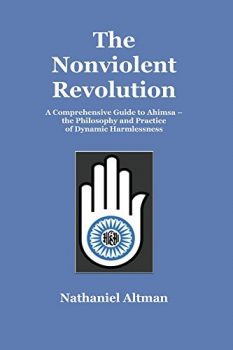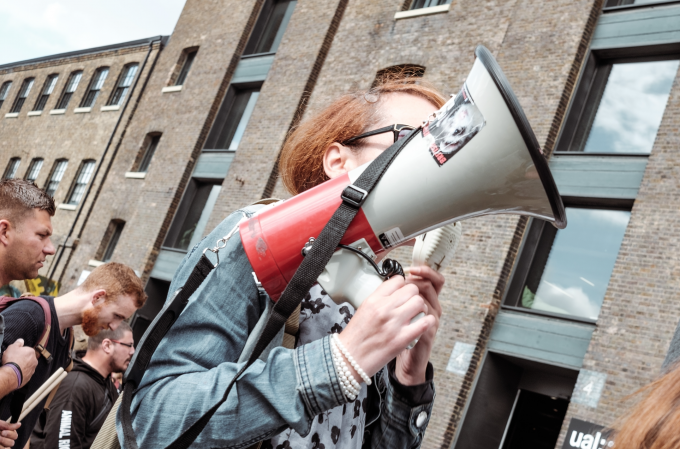In 1971, I was living at the Wheaton, Illinois, headquarters of the Theosophical Society in America, and working in their library. I wanted to know the meaning of life.
Everyone on staff was over 65 or under 25. No one else could manage on $100 a month plus room and board. I was one of half a dozen or so “young people.” So was a handsome, introspective guy from New York City, Nathaniel Altman. Like the other male workers — there weren’t many — he bunked on the 4th floor, and when he wasn’t busy with his grounds crew job, that’s where he’d be, working on his book, Eating for Life — the first volume on vegetarianism to be published in the U.S. in the 20th Century.
He’d type each chapter on his 4th floor manual typewriter, and bring it down to me in the library where I had access to a fancy electric typewriter — state of the art. I’d type, and proofread a bit, and think, “I know an author. Maybe someday I could be an author.” Eating for Life: A Book About Vegetarianism was published in 1973. My first book, Compassion the Ultimate Ethic: An Exploration of Veganism, came in 1985. I feel fairly prolific with 13 titles. Nathaniel has almost 30 — he’s always been ahead of me.
One of his most powerful works was The Nonviolent Revolution, published in 1989. Now, in response to  the 2016 election and the situation we see as we look out on the world, Nathaniel has updated and republished this important work. I interviewed him about the book, the state of affairs in our world, and why nonviolence is the pressing message of the present day.
the 2016 election and the situation we see as we look out on the world, Nathaniel has updated and republished this important work. I interviewed him about the book, the state of affairs in our world, and why nonviolence is the pressing message of the present day.
What is ahimsa?
The term ahimsa (pronounced əˈhimˌsä) comes from the Sanskrit, and has long been defined in India as “non-injury” or “non-killing.” Yet when viewed in a more active Western context, it means “dynamic harmlessness” or more properly “dynamic compassion.” This would not only encompass the renunciation of the will to kill or the intention to hurt any other living being through hostile thought, word or deed, but involves the conscious integration of compassion into every aspect of our everyday lives.
What brought you into the ahimsa lifestyle?
I had already become a vegetarian by the time I first learned about ahimsa in the early 1970s. The fact that ahimsa is so all-encompassing and practical appealed to me a lot. Ahimsa’s primary application, I believe, is achieving a level of inner peace; this is followed by peace with others and then expanding our circle to encompass the rest of the larger world community. Ahimsa has to do with what we eat, how we earn a living, what we spend our money on, what causes we support and the values we stand for as compassionate human beings. I remember reading from Martin Luther King, Jr.: “The choice today is no longer between violence and non-violence. It is either non-violence or non-existence.” This impressed me greatly and led me to believe that the journey towards ahimsa is a journey worth taking.
You wrote your first book, on vegetarianism, in the early 1970s, and you first published The Nonviolent Revolution in 1989. How are things different now?
When I first wrote Eating for Life in 1973, choosing a meat-free diet was considered a strange and even radical idea. Now vegetarianism- and veganism for that matter- have become part of the mainstream, not just in the United States but in many countries around the world. There is more nutritional and scientific information on plant-based diets available in books, magazines and on the Internet than ever before, plus the number of restaurants that offer vegan and vegetarian cuisine has grown tremendously. There is also much more support available for those interested in adopting meat-free diets, including organizations and individuals like Victoria who offer inspiration, information and practical guidance.
It’s exciting to see that the concept of ahimsa is becoming more widely understood, and that more and more people are striving to practice a compassionate way of living. Yet at the same time, the acceptance of violence as a way to settle disputes is still very prevalent in the world; the threat of nuclear war is about as great as it has ever been; lying has become epidemic in the media, politics and business; millions of animals are still put to death every year for food, clothing and vivisection, the planetary environment is under constant threat due to rampant consumerism and the burning of fossil fuels. The challenges are great, and there is still much work to be done!
What do we need to do to join the revolution?
Although much easier said than done, I think the first step is to become more mindful of our thoughts, words and deeds every single day, because these all have an accumulative effect on the world around us. If we take human relationship as an example, we interact daily with dozens of people, whether at home, at work, at school, at the gym or when we go shopping. Even if we could make the charitable claim that if half the people over the age of 12 are responsible for at least ten negative thoughts, attitudes or actions every day, it shouldn’t be surprising that our world has often become a violent, insecure and unhealthy place to live. Yet if we make the effort to challenge wrong ideas, make compassionate choices in what we buy, what we eat and adhere to truth and kindness in our dealings with others, we not only create a more peaceful life for ourselves, but we can potentially benefit every living being on earth
Given the situation in the world today, are you optimistic about the future?
After the presidential election of 2016, I felt sad and depressed about the future of humanity. Yet my feelings eventually mobilized me to prepare the new edition of The Nonviolent Revolution, as well as a new edition of a book I wrote years ago about sacred trees. Although there is undoubtedly much evil in the world today, we need to recognize that far more people are striving to do good.
Each of us has a contribution to make that can have a positive and accumulative effect on the global peace picture. We can start with the little things. This can include learning how to be more patient with oneself and others, refraining from gossip, overcoming a harmful habit like smoking or resolving a conflict with another person. Adopting a lifestyle that does the least amount of harm possible to other living beings, following a path of right livelihood, enlightened consuming, recycling, helping others, planting trees, saving energy, and supporting individuals and organizations that work for good are all things an individual can do to achieve both personal and planetary healing. Even though the results of our efforts may not be immediately obvious, they have an impact!
Plus we may not be able to achieve everything we aspire to accomplish and we will most certainly make mistakes. As with any journey, we may lose our way at times, we may need to recover lost ground, we may need to take an occasional detour, or we may be frustrated with our progress. But I feel it is a journey worth taking. Although born out of inner reflection, a life dedicated to ahimsa is both dynamic and expansive. It contains both the seeds of self-transformation and lays the groundwork for the transformation of society
Nathaniel Altman is a Brooklyn-based writer, teacher and counselor who has authored more than twenty published books on peace studies, healthy diets, alternative healing, nature and relationship. A student of political science and metaphysics for over 40 years, Nathaniel is a writer, lecturer and workshop leader. He was a faculty member at the Krotona School of Theosophy in Ojai, California, and has appeared on over 150 radio and television programs throughout the United States and Canada, Australia, Latin America and Europe. His articles have appeared in a variety of publications, including Good Housekeeping, Natural Health, Well Being, Free Spirit, Vegetarian Times and USA Today. Find him at www.nathanielaltman.com.
Victoria Moran takes very little credit for this post because all I did was ask questions and let Nathaniel’s brilliance and commitment do the rest. I am grateful and honored to have followed in my friend’s footsteps as an author, with 12 titles extant including Main Street Vegan and Creating a Charmed Life. Coming in December 2017 is The Main Street Vegan Academy Cookbook, coauthored with JL Fields and Main Street Vegan Academy coaches.




Sometimes I often get overwhelmed by all that should be changed in the world and REVOLUTION sounds so all-encompassing and extreme…but after reading this blog post, I feel that a grass roots effort is needed and that starts with self. The small steps we take in our own lives CAN have a positive ripple effect that can lead others to change. As Nathanial recommended…be mindful of thoughts, acts, words and deeds. The accumulative effect can be revolutionary…